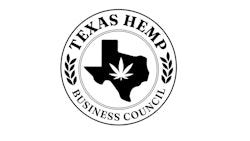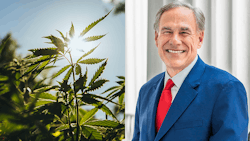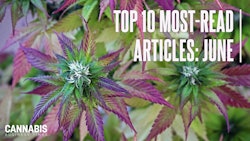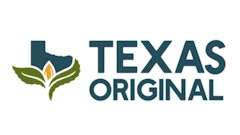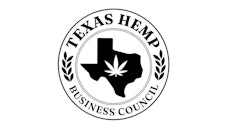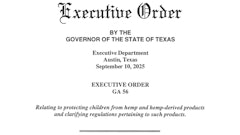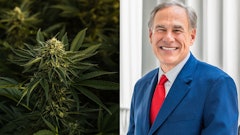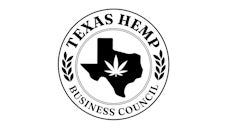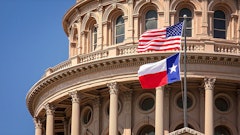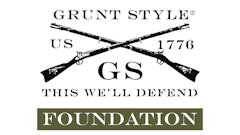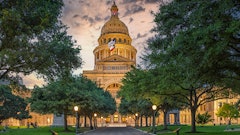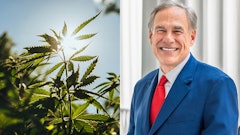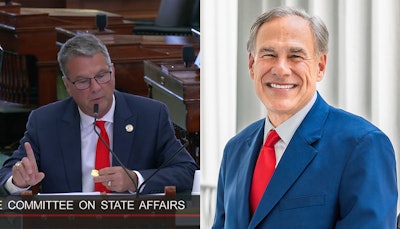
Texas Gov. Greg Abbott specifically called on state lawmakers to regulate hemp-derived products in his proclamation for a special session earlier this month, but the chief executive further explained his position on July 22.
Abbott, who vetoed Senate Bill 3 last month in the regular session—legislation that aimed to implement a blanket ban on consumable hemp products containing detectable amounts of THC or other intoxicating cannabinoids—clarified his stance with multiple news outlets this week.
Specifically, Abbott is calling on the Legislature to:
- ban all cannabinoid hemp products for those younger than 21 years of age;
- ban consumable products containing synthetic cannabinoids, such as delta-8 THC; and
- regulate a hemp industry for adults to ensure that products intended for human consumption don’t exceed 0.3% THC or 3 milligrams of THC.
“Let me be clear: I stand in favor of doing all we can to protect the lives of our children while also protecting the liberty of adults,” Abbott told Fox 4 on Tuesday. “With regard to adults … we do want the THC level to be below 0.3% or … 3 milligrams of THC; it’s called nonintoxicating levels of hemp that would be marketed.”
The governor said his vision includes a highly-regulated system where there would be enforcement checks throughout the supply chain, from hemp farmers to wholesalers, manufacturers, distributors and retailers.
“The only way we’re going to be able to do this is through tough enforcement,” he said. “The money for enforcement would come from all the market participants, and we would create an enforcement structure like what we have in the alcohol system that would ensure that the [Texas Alcoholic Beverage Commission] would be involved in the process.”
Abbott also made clear that he wants Texas to continue to criminalize nonmedical cannabis possession and sales despite Lt. Gov. Dan Patrick claiming that the governor wants to “legalize recreational marijuana” following the June 22 veto of S.B. 3. As the presiding officer of the Senate, Patrick spearheaded S.B. 3’s blanket ban in the regular session.
Despite Abbott’s call to regulate consumable hemp products in the special session, Sen. Charles Perry, R-Lubbock, filed S.B. 5 to kick off the 30-day special session on July 21. The legislation mirrors S.B. 3’s intent: to ban consumable hemp products containing any amount of THC or other intoxicating cannabinoids, providing exceptions only for nonintoxicating CBD and CBG.
S.B. 5 received a hearing in the Texas Senate State Affairs Committee on July 22, when Perry told lawmakers that hemp-derived THC products “is not a regulatable situation.”
Perry said that Texas businesses manufacturing and selling intoxicating hemp products voluntarily “play roulette because they know we don’t have the enforcement in place nor the regulatory framework to ever stay ahead of the chemistry.”
Before the committee voted, 10-0, to advance S.B. 5, its members invited law enforcement officials to provide testimony in support of the legislation, including Allen Police Chief Steve Dye and Chambers County Sheriff Brian Hawthorne.
In particular, Dye said he was representing roughly 1,700 members of the Texas Police Chiefs Association, serving as the organization’s sergeant at arms.
“It is the opinion of the Texas Police Chiefs Association that no amount of personnel or resources in a state this large with this many locations will ever be effective in regulating these dangerous products, which is why the ban is the only viable solution to protect our community from these harmful products,” Dye said.
While there are roughly 8,000 hemp THC product retailers in Texas, the Texas Alcoholic Beverage Commission (TABC) regulates more than 50,000 licensed businesses and more than 100,000 out-of-state producers and distributors each year, according to the TABC.
Hawthorne testified on behalf of the Sheriff’s Association of Texas, which he serves as president.
“Since 2019, we’ve allowed Texas to become a de facto recreational drug state,” Hawthorne said. “And by we, I mean all of us in government: state leadership, state regulatory agencies, law enforcement and prosecutors. We all have failed to prevent the proverbial camel nose from peaking under the tent. The camel we fight against is recreational marijuana. Under the false label of hemp, we have allowed illegal marijuana and THC products to infiltrate our state.”
While some law enforcement officials claim Texas’ hemp THC industry has become too big to regulate, Abbott said he sees it differently.
“Every law enforcement official I’ve talked to has said the same thing, and that is they don’t have the resources to regulate it,” the governor said. “And if they had the resources to be able to regulate it, they would be able to do it, for one. For another, if they’re measuring the hemp product, not based upon the current methodology of 0.3% THC, but on the milligram basis, it’s a whole lot easier to be able to measure it.”
After the Senate State Affairs Committee provided its invitees unlimited time to testify in support of S.B. 5, the body limited all others to two minutes.
Many of those who testified in opposition to the legislation presented similar stances to their previous fight to defeat S.B. 3: They support regulations to age-gate products to deny access to those under 21 years old; to prohibit sales near schools, parks, playgrounds and other areas frequented by children; to require product testing and ensure accurate labeling; and to prevent products and packages from being marketed in manners attractive to children.
Texas consumable hemp product stakeholders also continued to point out that their industry provides millions of dollars in tax revenue and employs some 50,000 workers.
Meanwhile, Todd Harris, the co-owner of Austin-based The Happy Cactus Apothecary, questioned why lawmakers in the state capitol were back pushing the hemp THC ban after Abbott said the special session should revolve around regulation.
Editor’s note: According to the Texas Constitution, “there shall be no legislation [in special session] upon subjects other than those designated in the proclamation of the governor calling such session.”
Harris also scolded Perry for pointing to a court decision in Arkansas as justification for his legislation to ban hemp THC products in Texas.
“Texas does not take its cues from Arkansas,” Harris said. “Texans have spoken for themselves loudly, clearly. You’ve heard the facts, and consistently from veterans to farmers, small business owners, to everyday consumers, the message is the same: We don’t want to ban. We want safe access, fair regulation, freedom of choice, not government overreach, which frankly, this bill feels less like Texas values and more like big government in disguise.”
Harris also pointed out that The Happy Cactus, with two licensed hemp shops in Austin, does not provide access to those under 21 years old.
“We serve over 15,000 adult customers every single year,” he said. “They come back two to three times a month. Not one of them is under 21. And we know this because we card every customer, just like we card Lieutenant [Governor] Dan Patrick in our shop. Our regulars include teachers, EMS workers, veterans, seniors, contractors, and even doctors—pretty wild. If these products were truly dangerous, why would respected professionals rely on them month after month? The truth is these products are helping people.”
RELATED: Texas Lieutenant Governor ‘Carded’ at Compliant Austin-Based Hemp Retailer
Earlier in the hearing, Perry claimed that Texas hemp stores have had seven years to age-gate customers but have failed to do so, adding that age-gating has “never worked out,” pointing to kids who drink and drive, saying that age-gating is “just another cover to legitimize a bad thing.”
Although youth access is often cited as a concern among prohibitionists, a report recently released by the Washington State Liquor and Cannabis Board shows that licensed and regulated cannabis dispensaries were 95% compliant in age-gating purchases in 2024, compared to 88% for the tobacco industry, 83% for the vape industry and 77% for the liquor industry.
Harris said that he worried elected officials in Texas are “intentionally distorting the truth” to push a hemp THC ban that’s driven by special interests over public interests.
“We know Dan Patrick took money from alcohol companies to push this ban,” Harris said. “So, Senator Perry, I truly hope that you haven’t taken money from alcohol companies as well.”











